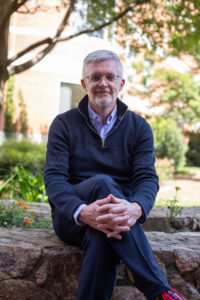News & Stories
The unexpected CEO

Ask Atlas Clinical Research CEO Mark Scullion (MBA ’07) what he has been up to lately and there’s a lot he could say but doesn’t.
He could say that since its 2023 launch, Durham-based Atlas is already accelerating global patient recruitment for potentially life-changing clinical trials to treat osteoarthritis, post-traumatic stress disorder, chronic back pain and COVID-19.
He could talk about how his company reflects a healthcare industry shift toward personalized medical care and consolidates tens of thousands of global clinical trial listings scattered across individual websites into larger site networks.
Or he could say that someone who completes a first-stage trial for a new diabetes drug can easily see second- and third-stage advanced trials available through Atlas.
But he talks about something else first.
“My daughter is starting her college applications and tours now,” says Scullion. “She would like to do biology. She’s planning for veterinary school, but she grew up in Chapel Hill. She’s been wearing Carolina gear since she was 4 months old, so this is her school. But she would also quite like to have a little bit of independence from her parents. And probably some distance.”
Even after 15 years as an influential pharmaceutical executive in the clinical research industry, Scullion is far from a stereotypical hard-edged CEO. He has a quiet confidence. He’s direct, soft-spoken and a genuine listener. He admits when he doesn’t know something and values hearing others’ opinions and ideas different from his own. And he’d never studied finance, accounting, strategy or operations before enrolling in UNC Kenan-Flagler Business School’s Evening Executive MBA Program.
Scullion knows his work is bigger than himself. That’s why he does it, that’s why he loves it, and that’s why he typically lets Atlas’ work speak for itself.
“I’m optimistic that the healthcare industry can be improved,” says Scullion. “And I’m certain that if no one tries, then it won’t.”

Scullion was integral to Atlas Clinical Research’s launch in 2023.
Effective and efficient
In 2024, an estimated 7,100 clinical trials were completed in the U.S. and over 515,000 registered trial patients worldwide. Thanks to recent clinical trials, significant advances have been made in understanding the progression of Alzheimer’s disease, developing gene-editing therapies for sickle cell disease and treating obesity.
Despite that, an estimated 80% of clinical trials are delayed or closed because of recruitment issues. Delays cost trial sponsors up to $8 million a day. More than one-third of clinical trial sites under-enroll patients and about 11% fail to enroll a single participant.
Atlas wants to bridge this chasm.
Guided by “the relentless pursuit of what’s possible,” Atlas is a network of trial sites supporting the pharmaceutical industry and contract research organization (CRO) partners who oversee studies testing the safety and efficacy of a new drug or medical device. Atlas works closely with CROs and clinical trial sponsors to speed up patient recruitment and help investigators collect clinical trial data.
Focusing on cardiovascular, central nervous system, infectious disease and gastrointestinal conditions, Atlas’ network includes clinical research sites outside of Buffalo, Philadelphia and Tampa. They are planning sites across the United States to reach new patients.
“We’re lengthening the ladder and making it clear where the rungs are,” says Scullion. “There are possibilities everywhere. Often people just do not know there’s a trial they can do. We want to make trials more effective but also make trial sites more visible and sustainable. We want to open as many doors as we can for as many people as we are able.”
Scullion has been integral to Atlas’ success from the start. When it launched in 2023, he was a senior executive advisor at private equity firm BPOC when it partnered with him to build what would become Atlas. Previously, he was the Switzerland-based global head of trial monitoring for Novartis, where he led a team of clinical professionals managing over 300 clinical studies through 14,000 investigative sites worldwide.
Prior to that, he spent six years in various positions at Quintiles, now IQVIA, after graduating from UNC Kenan-Flagler.
It’s a career path Scullion never anticipated. He earned two liberal arts degrees — a bachelor’s in French and Portuguese and a master’s in European politics — and was very happy with his positions in higher education, first as the director of the University of Southampton’s European office then moving to the University of Manchester.
Before he was a UNC Kenan-Flagler student, Scullion was a UNC Kenan-Flagler staffer. Scullion was the director of the international office at the University of Manchester’s business school when he was invited to interview for an associate director of undergraduate global programs role.
He had never been to North Carolina before he and his wife, Claire, visited campus for the interview. At the end of the last day there, they both came to the same conclusion.
“I said to her, ‘I think if we have the opportunity to come here, we should come,’” says Scullion. “And she said, ‘So do I.’ There was something atmospherically different about this place. It still feels that way.”
He loved his job at UNC Kenan-Flagler in the Undergraduate Business Program. He helped develop GLOBE, now TREBLE, in partnership with global business schools offering immersive educational experiences. He had no plans to switch fields, but a friend who worked at IQVIA, a leading global CRO, introduced Scullion to his boss. He was hired in 2007 and less than two months later his ideas were presented to the CEO.
“I didn’t think that the job was the thing for me at all at first,” he says. “I was interested in it conceptually as a public good, but as a career for me? Absolutely not. I think I was brought in because I was seen as somebody who was going to bring a different perspective. And then once you’re in it you think that if you can make this one thing a little better, we could all get a lot better.”
After a few years, Scullion came to a career fork. He considered returning to higher ed, pursuing a PhD or staying in healthcare.
He decided that an MBA would be useful for any next step, and UNC Kenan-Flagler was his first and only choice.
“There is something wonderfully challenging about the program,” he says. “It was the first time that I have been in school formally where I came to class every time and had to be right up on my toes because it was all new. The excitement just sets in.”

“I don’t need to be the person who rushes to the front to be a leader,” says Scullion.
A different kind of leader
Every Friday morning, Scullion and his Atlas leadership team meet for 90 minutes. Before getting started, the team asks each other to send the key things they’d like to cover or what they think everyone should know. It’s not Scullion’s meeting. It’s the team’s.
“I don’t need to be the person who rushes to the front to be a leader,” he says. “But if you tell me what the problem is and I think I can contribute something to it, then I’m in.”
A few years ago, Atlas Clinical Research was a slide deck, an idea with a little money behind it. It was the first time in his career that Scullion had the opportunity to create something new.
He expects those who knew him as an employee and then a student at UNC Kenan-Flagler would be surprised to learn he’s a CEO. They would never have thought that he would want to be. He didn’t either.
“I believe people come to us because they see that there’s something here. They believe in what we’re trying to do. You can’t take that lightly,” he says. “I was lucky to work with people at UNC Kenan-Flagler who were supportive, lucky to be in jobs where different ideas were encouraged. When I took that job after my MBA, I told my boss that I’d stay as long as I was doing something valuable, that made me feel like I was doing something useful. That was nearly 20 years ago.”